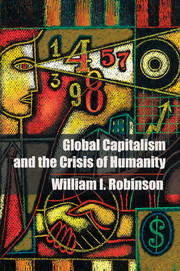5 - Policing Global Capitalism
Published online by Cambridge University Press: 05 August 2014
Summary
This is an extremely important moment: the point where, the repertoire of ‘hegemony through consent’ having been exhausted, the drift towards the routine use of the more repressive features of the state comes more and more prominently into play. Here the pendulum within the exercise of hegemony tilts, decisively, from that where consent overrides coercion, to that condition in which coercion becomes, as it were, the natural and routine form in which consent is secured. This shift in the internal balance of hegemony – consent to coercion – is a response, within the state, to increasingly polarization of class forces (real and imagined). It is exactly how a ‘crisis of hegemony’ expresses itself. . .. the slow development of a state of legitimate coercion, the birth of a ‘law and order’ society.. . . The whole tenor of social and political life has been transformed by [this moment]. A distinctively new ideological climate has been precipitated.
Stuart Hall and his colleagues, in Policing the CrisisResponses to the Crisis
How have social and political forces around the world responded to the global crisis? When we observe that the structural crises of the 1870s, the 1930s, and the 1970s had been resolved through a restructuring of the capitalist system, this does not mean that things necessarily got better for the mass of humanity. “Resolved” means that restructuring allowed for the resumption of sustained accumulation. As I have emphasized thus far, crises open up the possibility of change that can go in many different directions. How a crisis unravels depends, among other things, on the agencies of the constellation of social forces that come together in particular conjunctures, the correlation of force among classes in these conjunctures, distinct projects that are put forward in response to the crisis, political conditions, and contingency – all within the bounds of what is structurally possible. Here I identify three responses to the crisis that are in dispute, although this does not mean that there are not, or will not be, other responses not addressed here.
- Type
- Chapter
- Information
- Global Capitalism and the Crisis of Humanity , pp. 158 - 213Publisher: Cambridge University PressPrint publication year: 2014

